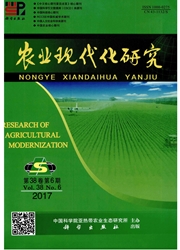

 中文摘要:
中文摘要:
针对目前我国养猪业带来的环境面源污染和猪肉质量安全等问题,本文提出了生猪供应链绿色运营模式。运用演化博弈理论,构建了市场机制和政府监管条件下生猪供应链绿色运营模式演化博弈模型。在分析养猪户和屠宰加工企业不同策略下各自的成本和收益基础上,进一步分析了生猪供应链绿色运营模式演化路径及其影响机理。研究结果表明:在完全市场机制作用下,生猪供应链绿色运营模式演化与养猪户和屠宰加工企业绿色运营策略下的收益增加率密切相关,演化路径与双方存在“搭便车行为”时所获得的收益大小有关。如果“搭便车”行为从对方绿色运营行为中获得的收益很大,则生猪供应链演化为绿色运营模式的概率会大大降低。政府环境规制对“搭便车”行为进行惩罚,迫使养猪户或屠宰加工企业选择绿色运营模式,对选择绿色运营模式策略但收益增加比率较小的养猪户或屠宰加工企业给予适当的补贴,将促进生猪供应链绿色运营模式的演化。最后根据研究结果,从政府环境管制、供应链纵向合作关系、激励扶持、绿色养殖技术推广和指导等方面给出了相关政策建议。
 英文摘要:
英文摘要:
Focusing on China's environment pollution and pork safety problems and applying the evolutionary game theory, this paper introduced a green operation mode of the hog supply chain and built an evolution game model of the green operation mode of the hog supply chain under the conditions of marketing mechanism and government supervision. Furtherly, based on the cost and benefit analysis of scaled hog operations and slaughtering and processing enterprises with different strategies, this paper also analyzed the evolution path and influencing mechanism for the green operation mode of the hog supply chain. Results show that: under the free market mechanism, the evolution of the green operation mode of the hog supply chain was related to the output-input ratio and the evolution path was related to the revenues from the "free-rider" behaviors of both hog farmers and slaughtering and processing enterprises. If the profit from "free-rider" behaviors was high hog farmers and slaughtering and processing enterprises will not select the green operation mode. The Government should use the environmental regulations to promote the green operation mode evolution through two types of mechanism: 1) creating punishment measures for the "free rider" behaviors and forcing both pig farmers and slaughtering and processing enterprises to select green operation mode; and 2) providing appropriate subsidies for pig farmers or slaughtering and processing enterprises with a relatively low input-output ratio. Finally, this paper suggests that the Government should perfect the environmental regulations, encourage vertical supply chain collaborations, and provide incentives and guidance to promote the green breeding technology.
 同期刊论文项目
同期刊论文项目
 同项目期刊论文
同项目期刊论文
 期刊信息
期刊信息
